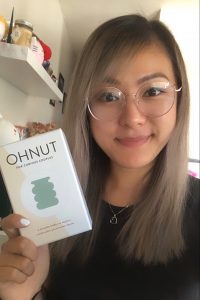
Sandy Wu is a second-year medical student working on the OhNut Study, a clinical trial investigating if a device called the “OhNut” can help women who experience painful sex, to have less pain during sex.
We talked to Sandy to find out what drives her to seek change for Women’s Health.
What inspired you to do research on painful sex, or become a doctor in general?
Funny story; I was playing doctor with a family friend and he told me I couldn’t be the doctor because I was a girl. Five-year-old me was extremely upset, and so I told the world I wanted to be a doctor! Since both my parents had chronic illnesses, I spent a lot of time Googling symptoms and learning about how to care for them. I became more and more interested in what I was reading, ultimately motivating me to study health and life sciences.
Aside from growing up in an Asian Canadian family where menstruation is a taboo topic, I also lived in a place where commuting to the nearest youth clinic was not possible; as a consequence, I relied on the internet for information. I personally experienced very heavy and painful periods. Whenever I tried to ask about it, I was always told that it was “normal”, that my female family members had the same experiences, and that I shouldn’t keep asking. Of course, I only had more and more questions, and so this fueled my curiosity in women’s health and endometriosis.
How do you think the OhNut study will benefit patients?
This project is really unique in that we are looking to see if a device used during sex will help to alleviate pain, but also to determine if both sexual partners like the OhNut. We will be using validated assessments to measure how useful the device can be overall. If our project finds that the device works and is generally acceptable by participants, the OhNut may be helpful for people with endometriosis and painful sex as a self-management option.
Why do you think severe period pain/endometriosis is perceived as the ‘norm’ in today’s society?
I think it stems from severe period pain being so common yet perceived as shameful. It is fine for women to talk about anything else so long as it is not about our genitalia and periods. In the past, women on their periods in some cultures were forced to live in a different place than men because they were considered ‘dirty’. Many negative associations with menstruation still exist today, and only in the last century have people started to talk about it. Normalizing period pain forces women to undervalue their bodies and symptoms.
What efforts are the Endometriosis Pelvic Pain Laboratory making to change this stereotype?
Our lab is currently conducting research on a variety of aspects in womens’ health to help change the conversation, create educational resources, and empower people with endometriosis to seek treatment and manage their symptoms. For example, the OhNut is a product that is marketed for helping people reduce pain associated with sexual intercourse. Our study is the first study of it’s kind that allows patient-centered management of painful sex as opposed to standard therapy which requires the help of a professional.
We also have a new website called Sex, Pain & Endometriosis launching this fall which will share everything we learned about painful sex and endometriosis over the last 10 years with the public.
I am so grateful to be a part of a group that appreciates the many different types of pain that people with endometriosis experience and views the patient as a whole person, rather than just their disease.
— Written by Olivia Woo